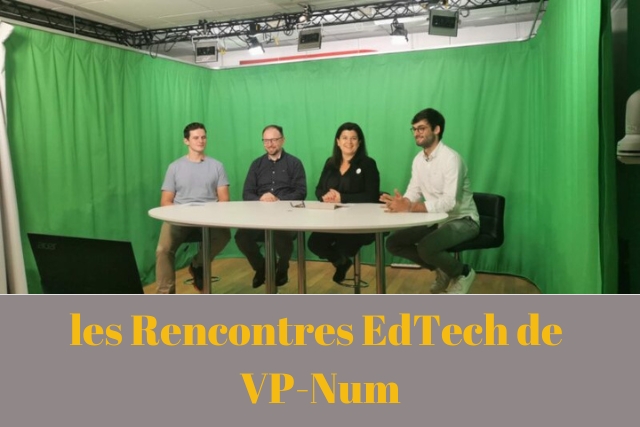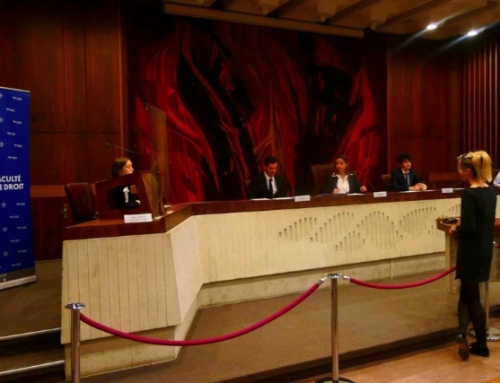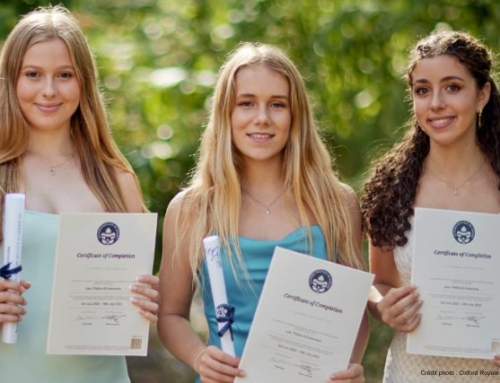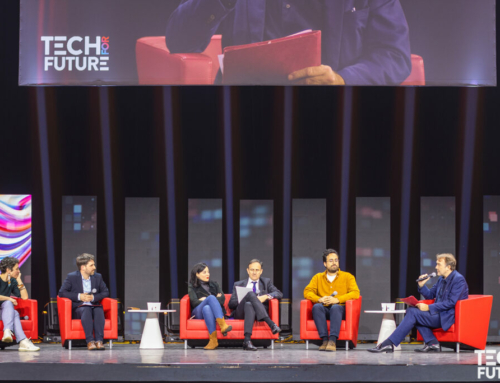A look back at VP-Num’s EdTech Meetings organized by Simone et les Robots on June 24, an event bringing together university vice-presidents and EdTech players.
The genesis of this event stems from an observation made in 2019: a lack of knowledge and mutual understanding between the EdTech ecosystem on the one hand, and universities on the other. Indeed, Simone et les Robots has set itself the mission of facilitating communication between these worlds, which operate differently yet share a common project: improving teaching conditions in higher education.
This led to the idea of organizing a meeting place to encourage exchanges. A dozen or so companies offering solutions particularly suited to the needs of universities came together and took the time, over the course of a day, to explain their mission and answer the universities’ questions.
How do you innovate effectively? By getting all the players in the same room (or almost in the same room) to listen to each other and exchange ideas.
Two key words illustrate the diversity of cultures and approaches that we have sought to clarify in imagining these Encounters :
Accelerate !
It’s the key word that most often illustrates debates around the digital transformation of organizations, and as we’ve often pointed out here, the University has been engaged in its digital transformation for several years now. Whether internally or thanks to external solutions, since the health crisis it has made the issue of educational technology one of its top priorities, and thus created an acceleration in innovation and the use of digital pedagogical solutions. Needs have changed profoundly, and it is now necessary to respond to them effectively and on a massive scale. The world of EdTech is naturally contributing to this craze for technology at the service of tomorrow’s education. And every company in this fast-growing sector is developing new digital solutions to enable a continuous evolution in practices and behaviors, whether in terms of pedagogy, student life, or new forms of collaborative work for staff and future graduates. So, at a more sustained pace, innovation is benefiting from feedback from universities that have finally made massive use of EdTech technologies during the confinement period, and have seen for themselves just how useful they can be.
Naturally complex !
Organizing better communication between companies eager to prove their relevance, and universities hosting tens of thousands of people with varied statuses and different challenges, is not easy. On the contrary, in order to respect the complexity of both worlds, we decided to create the Rencontres, a private meeting where universities could discover, by theme, solutions to the various challenges they face today and will face tomorrow. For their part, the EdTech companies present were able to get in touch with university decision-makers, in a format that left plenty of room for discussion and collaboration.
We were at the end of 2019, when VPNum’s EdTech Encounters were born !
The health crisis was still in its early stages. The first edition of the Encounters, scheduled for March 24, 2020, had to be cancelled, and universities were entering an era that would overturn some of their priorities in terms of digital strategy.
Comment avons-nous imaginé les Rencontres EdTech de VPNum ?
Première du genre, ces Rencontres inédites ont permis aux décideurs politiques que sont les Vice-présidents numériques des universités, d’échanger tout au long d’une journée avec des acteurs majeurs de l’écosystème EdTech français et européen sur des sujets d’actualité identifiés en lien avec elles.
-
Video and its role in hybrid or distance learning
Video has become an indispensable and ubiquitous medium in our daily lives. In the midst of thousands of video contents, educational contents have also flourished. Jean-Marie Cognet, founder of Ubicast, Nicolas Can, coordinator of the Esup-Pod project, Stéphane Barbati, CEO of Kalyzee, and Fabrice Mercier, founder of RapidMooc, were there to tell us all about it. And all agreed that the quality of video capture and the experience of both the producer and the viewer are essential to facilitate its use and keep the viewer’s attention.
“Our initial observation was that, as early as 2004, students were looking for a video format. But making and distributing a good video required technical skills. We wanted to make it easier for teachers to use this technology” Stéphane Barbati, co-founder of Kalyzee.
-
Visual collaboration to rethink classroom ritual and prepare for the future of hybrid work
At a round table discussion with Guy Melançon, Vice-President of Digital at the University of Bordeaux, Matthieu Poupard, Director of Partnerships at Klaxoon, and Lamise Guenni, a student at Sorbonne-Université, we talked about visual collaboration, or how to teach students to work together in the classroom or remotely. Klaxoon’s solution brings together all the tools used in collaborative work, to energize and improve engagement and information retention, both in business and at university.
“Klaxoon products allow us to bring together people who think in a digital world.” Guy Melançon, Vice-President of Digital, Université of Bordeaux.
“Online collaboration tools are also a way of breaking down geographical barriers and working from anywhere, so they’ve become part of my daily routine,” says Lamise Guenni, a student at Sorbonne University.
See the pictures below of the round table discussion with Guy Melançon, digital vice-president at the University of Bordeaux, Matthieu Poupard, director of partnerships at Klaxoon, and Lamise Guenni, student at Sorbonne-Université.
-
Do immersive environments enhance learning?
We spoke to Nicolas Dupain, CEO of Immersive Learning Lab, and Nora Van-Reeth, Head of Innovative Pedagogical Projects at Lyon 1 University, about the role of immersive environments in learning. Today, we know that hands-on learning improves information retention by over 90%, compared with 70% in conventional courses. The immersive environment not only enables us to practice, but also to create a memorable experience through the use of the senses. What’s more, visualization and contextualization greatly enhance engagement!
“We have been using immersive technologies for the past 2 years, and in particular we have created the Virtual Lab […] The main advantage of these technologies is their ability to anchor memories and the infinite possibilities, such as visiting the human body cell” Nora Van-Reeth, Lyon 1 University.
-
How can we improve the student experience?
The key to learning is student involvement. The more active they are, and the more access they have to fun and challenging tools, the better their experience will be. The human body reacts and secretes pleasure hormones, endorphins, when stimulated and put in a competitive situation, with a reward at stake. Wooclap, an interactive platform, enables quizzes and votes to be set up, creating interaction between teacher and students, and making them players in their own learning. In addition to enhancing the student experience, these interactions enable teachers to assess learners’ level of knowledge and understanding of the course. Around the table, Fabien Maurin, French market manager at Wooclap, Pierre Boulet, vice-president of the University of Lille, and Tristan Lafosse, student at University of Créteil !
“Creating small questionnaires, used randomly in class, allows us to be more challenged and to follow more closely, and it also allows our teachers to get feedback on notions that are understood or not” Tristan Lafosse, student at University of Créteil.
Check out the images below from the round table featuring Fabien Maurin, Wooclap’s French market manager, Tristan Lafosse, a student at University of Créteil and Pierre Boulet, digital vice-president at the University of Lille.
-
Can a mobile app improve the student experience ?
This topical issue gives Appscho CEO Victor Wacrenier the opportunity to share with us the importance of mobile applications in the student experience. By digitizing the campus, we make it available to students anytime, anywhere. We bring together in a single space all the essential information and services they need. 100% of students in France own a cell phone. It’s the tool they use the most, and the one they master the best. That’s why it’s so important to make it part of their daily lives on campus.
“By developing new channels like notifications, universities can greatly improve communication with students.” Victor Wacrenier, CEO of Appscho
-
Virtual classrooms : what alternatives to American solutions?
What if we had the possibility of using tools other than the American solutions already deployed in the majority of establishments, but which do not always guarantee data security? This was the subject of our last round table. When Fabrice Lenoble, CEO of TeachReo, realized that our EdTech day would be broadcast on Zoom, he was sure to fall off his chair! But, did we have another solution that could be easily used by all participants? That’s exactly what he came to say, and what he debated alongside Pierre Boulet and Isabelle Olivier. TeachReo is a virtual classroom solution based on BigBlueButton technology, which lets you create remote courses and even exams.
“TeachReo has been organizing virtual classrooms for 5 years now. We made the choice to base ourselves on the BigBlueButton solution, which is a solution developed for teachers, by teachers.” Fabrice Lenoble, CEO of TeachReo.
The aim of the day was to facilitate dialogue. We wanted to make our offerings clearer, and our expectations more understandable, by encouraging short, focused presentations. Demonstration videos complemented the sometimes technical presentations, and feedback from facilities and solution users enriched the discussions. A variety of presentation formats set the pace for a dense and intense day.
Simone et les Robots is at the interface of the EdTech and university ecosystems. Our mission is to support their development, while respecting each other’s objectives and expectations. Simone et les Robots’ collaborative approach to its customers and partners is to make the complex issues and constraints of the university system clear and understandable.
So it was only natural for us to become fully involved in the creation of this event, alongside the association of digital vice-presidents of French universities.
Creating the conditions for listening, for a respectful conversation between these two worlds, is not always easy, but proves fascinating.
Our conviction is that the complexity of a system reflects a demanding and precise way of operating that honors the French academic world and is certainly reflected in the creative spirit of EdTech start-ups. Managing to simplify this complexity is an extraordinary human adventure. We’re convinced that the co-design of tomorrow’s digital solutions depends on these new kinds of encounters. We look forward to seeing you in the years to come, as we are committed to serving higher education !






